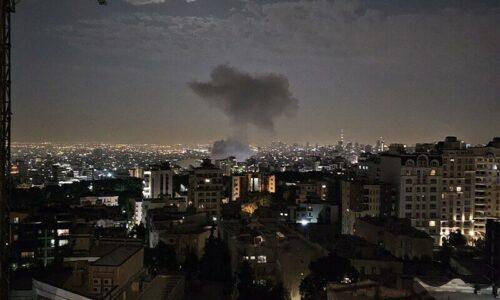By: Ahsan Ansari
The recent war between Iran and Israel has intensified concerns across the Middle East, creating new challenges for regional stability, global diplomacy, and economic security. For Pakistan, the unfolding crisis presents a serious geopolitical dilemma. As a neighboring Muslim country with strong ties to both Iran and the broader Islamic world, Pakistan has voiced deep concern over the conflict while seeking to maintain strategic balance and avoid becoming entangled in the escalating hostilities.
Pakistan’s official position on the Iran-Israel war has been clear and consistent. The Foreign Office condemned the Israeli airstrikes on Iranian territory, calling them a violation of international law and an attack on Iran’s sovereignty. Prime Minister Shehbaz Sharif, along with military leadership, described the war as a dangerous development that threatens regional peace and warned of its grave humanitarian and economic consequences. Pakistan has expressed its support for Iran’s right to self-defense but has also urged both sides to show restraint and return to diplomacy.
Pakistan’s strategic response has been shaped by multiple considerations. On one hand, Pakistan has deep historical, religious, and cultural ties with Iran. On the other, it maintains strong economic and political relationships with Gulf Arab states and Western allies such as the United States. These complex alliances require Islamabad to carefully manage its rhetoric and avoid siding too strongly with any party. At an emergency meeting, Pakistan’s Foreign Minister Ishaq Dar stressed the need for a peaceful resolution and warned against further escalation, particularly cautioning Iran against retaliatory moves that might draw in other Muslim nations.
The impact of the Iran-Israel conflict on Pakistan has been both immediate and far-reaching. Economically, the war has triggered a sharp rise in global oil prices. Pakistan, already struggling with inflation and a weak economy, is now facing even higher fuel and import costs. Transport expenses and electricity tariffs have increased, putting additional pressure on ordinary citizens and the government’s fiscal policies. The State Bank of Pakistan has been forced to hold interest rates steady to avoid worsening inflation, and the rupee has come under stress in foreign exchange markets.
In addition to economic challenges, Pakistan is also facing security concerns. The possibility of conflict spilling over from Iran into Pakistan’s Balochistan region remains a real threat. Cross-border militant activity and refugee movement could destabilize the already fragile security situation along the Pakistan-Iran border. Earlier in January 2024, a serious incident occurred when Iran conducted strikes inside Pakistani territory targeting alleged militant camps. Pakistan responded with its own precision strikes, leading to a brief diplomatic standoff. However, both sides managed to de-escalate the situation through high-level diplomacy. This episode still serves as a reminder of the fragility of regional peace and the risks of miscalculation.
Internally, Pakistan is also concerned about the potential for sectarian tensions. In the past, regional conflicts involving Iran have led to increased polarization between Sunni and Shia communities within Pakistan. The government is monitoring religious organizations and has called on clerics from all sects to promote unity and avoid provocative statements. Law enforcement agencies have been instructed to stay vigilant and prevent any group from exploiting the war to stir sectarian unrest.
The conflict is also affecting Pakistan’s long-term strategic projects. The China-Pakistan Economic Corridor (CPEC) depends on a stable regional environment for progress. Any spread of violence into Iran or Afghanistan could jeopardize vital infrastructure, trade, and connectivity initiatives. Pakistan and China both view stability in the region as crucial to the success of Belt and Road-related investments. A prolonged war would create uncertainty for investors and delay key development goals.
At the international level, Pakistan has called for a renewed focus on the root causes of instability in the Middle East, especially the unresolved Palestinian issue. Officials in Islamabad argue that lasting peace in the region will only be possible through justice for the Palestinian people and an end to occupation and violence. Pakistan also continues to support a two-state solution and has urged the United Nations to play a more active role in resolving both the Palestine-Israel and Iran-Israel conflicts.
As the war enters a dangerous new phase, Pakistan remains committed to its policy of strategic caution. It continues to advocate for a ceasefire, support diplomatic channels, and avoid any direct involvement. The government’s goal is to protect national interests while standing in solidarity with affected nations and promoting peace in the region. With careful diplomacy and internal vigilance, Pakistan hopes to navigate this turbulent moment without compromising its stability or sovereignty.
The Iran-Israel war has placed Pakistan in a difficult but crucial position. The country must manage the economic fallout, guard against security threats, and maintain diplomatic balance in an increasingly polarized region. Pakistan’s response so far reflects a desire for peace, respect for international law, and a firm belief in the power of diplomacy over destruction.




